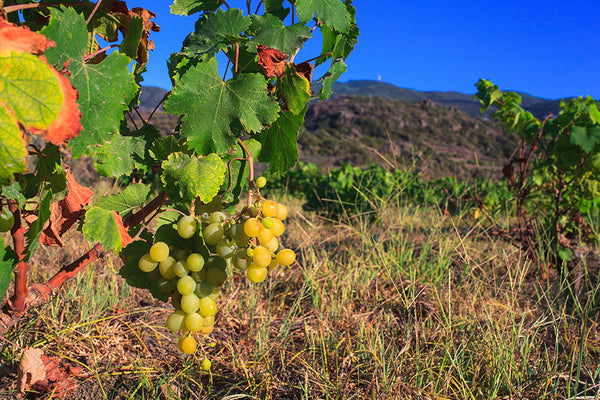Zibibbo
Did you know that Chardonnay, Moscato, and Sangiovese, to mention a few, are names of grapes they are made of? With over 10,000 wine grape varieties, only a fraction have achieved global popularity and acclaim. And there are those that don’t get as much press but more than deserve everyone’s attention. One of them is Zibibbo.
Zibibbo: Ancient grapes
Zibibbo is one of the oldest white grape varieties, which has retained its genetics and belongs to a group of roughly 200 muscat grapes. Also known as Muscat of Alexandria, this ancient bush vine has North African origins near the Mediterranean and was already used in winemaking by early Egyptians some 5,000 years ago.

Said to be Cleopatra’s wine of choice, its interesting name comes from the Arabic word zabib, which means raisins. The Phoenicians and Greeks brought zibibbo to Sicily in 800 BC, where it has since flourished, given its volcanic soil and intense heat. It also managed to reach Northern European regions during the Roman Empire.
Today, other countries are also cultivating zibibbo grapes, such as Spain, Australia, South America, and South Africa.
Zibibbo: Preserving the legacy
Modern times call for automated processes that help facilitate the production of most goods and services. However, zibibbo prefers not to.
Zibibbo’s vibrant yellowish-green ovoidal berries are cultivated through intensive old-school viticulture to produce wines. The ruggedly beautiful island of Pantelleria in Italy preserved this ancient process, making this muscat even more special given its difficulty and challenges. Growers would leave the vine to support itself on low ground and steep terraced walls instead of being tied up to protect its flowers from high winds. Hence, in 2014, UNESCO bestowed recognition on this vine training unique to its main stomping grounds in the province of Trapani.
Other complicated procedures are involved in zibibbo cultivation, which sets it apart from other grapes. One is its manual separation of grape clusters which cannot be automated since it breaks the stems that could get mixed up in the harvest. Zibibbo also requires late harvesting and nearly a month of drying to produce the desired sweet outcome.
Because of its specialized cultivation and limited availability, zibibbo is quite rare and comes with an ideal trifecta of a wine grape, a table grape, and a raisin. Such extraordinary versatility is something that you don’t find in other grape varieties.
Ultimately, zibibbo is a labor of love and a time-honored practice, but the results make it all worth it.
Zibibbo wines: fruity and bright
While many would argue that zibibbo is best enjoyed as a table grape, given its particularly sweet tangy pulp and as a raisin, it also makes for a nice yet mildly alcoholic wine.
One of the notable characteristics of zibibbo is its pleasant aromatic scent, breathing life into a bottle of medium-bodied wine. It has a brilliant golden liquid with hints of orange blossom, apricot, and almond, leaving floral and spicy notes on the palate.
Zibibbo wine has a smooth, fresh, and naturally sweet taste, perfect as a dessert wine, sparkling wine, and dry muscat served chilled. A sweeter wine version enhances the flavor of ice creams and desserts like cakes and pastries. Dry zibibbo wine has the muscat signature of grapey aromas and is a great aperitif that pairs nicely with tasty cheeses, vegetables, and seafood dishes.
Zibibbo FAQ
What type of wine is Zibibbo?
Zibibbo is a very ancient white grape originally from Egypt. This grape produces very aromatic still white wines as well as sweet dessert wines.
How do you drink Zibibbo?
As a still white wine Zibibbo is typically served cold. Zibibbo is a very aromatic wine and can be paired with shellfish as well as spicy dishes and in particular Indian food. Zibibbo is also perfect as a dessert wine and pairs well with Sicilian Cassata and other traditional Sicilian desserts.
Is Zibibbo a dessert wine?
Zibibbo can be both a dessert wine and a still white wine. The grape can be used to make both types of wines because of its aromatic nature. In fact Zibibbo is one of the most aromatic grapes in existence.
Is Zibibbo a white wine?
Yes, Zibibbo is a white wine that can be produced as either a dessert wine or a still white wine due to its aromatic nature.

